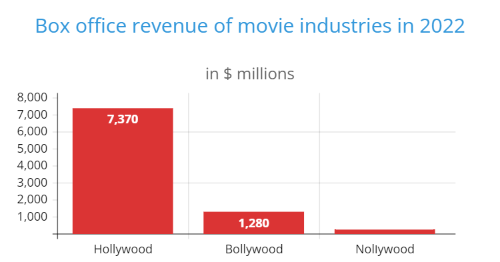Nollywood is the second largest film industry in the world and contributes 2.3% to Nigeria’s GDP, and now filmmakers are creating startups to develop niche solutions for the industry.
Last year, Nollywood, Nigeria’s film industry, made 1,923 movies, according to the National Film and Video Censors Board (NFVCB). That made Nollywood the second most prolific movie industry after Bollywood and before Hollywood, yet Nollywood struggles with box office revenue. In 2022, Hollywood made $7.37 billion, while Bollywood made $1.28 billion. The difference is glaring when placed beside the $203 million Nollywood made in the same year.

Chart by Muktar Oladunmade, TechCabal
A lot of issues can be blamed for this disparity. There are not enough cinema screens in the country; the consumer market is dwindling; there is a lack of quality control and avenues for feedback; there is a lack of patient funding; and creatives lack access. However, some filmmakers are taking matters into their own hands, using technology to solve some of these issues.
At The Annual Film Mischief (TAFM’23) FilmTech Conference, a gathering of technology enthusiasts in Nollywood, you would be forgiven if you thought it was not a gathering of creatives. Armed with pitch decks, presentations, and reports, movie industry enthusiasts showcased how their startups use technology to solve critical problems in the Nigerian film industry. Ojie Imoloame, the conference’s convener, told TechCabal that the conference was designed to showcase “the overwhelming opportunity in the film and creative space overall using technology”.
Seun Afolabi, a Yoruba film director at the FilmTech conference, shared that he attended the conference to learn how to use technology to improve his craft. “Most of the Yoruba movies you see are done in four days, but I want my movies to stand out. The world is smaller now; Spielberg (an American filmmaker) can load up Amazon Prime and watch Nigerian movies. I want him to see my movies and be impressed.”
Imoloame added that the conference also sought to bring like-minded creatives together to discuss how to advance Nollywood. “We were lucky to assemble virtually all the filmtech startups for a deep-dive conversation into startup building in this space,” he shared.
One of the startups present at the FilmTech conference was Albantsho, an online screenwriting discovery platform that uses scriptwriting software and a story marketplace to help screenwriters create and sell their scripts. Julie Ako, Albantsho’s cofounder, told TechCabal that a lack of avenues for her as a screenwriter to sell her scripts led to her starting Albantsho with her cofounder, Nikita Mokgware.
“Albantsho stems from my experiences as a screenwriter and filmmaker and the realisation that there were limited avenues for selling our scripts. This challenge wasn’t unique to us; many screenwriters and film creatives across Africa faced similar struggles,” she said. Albantsho also connects screenwriters together. “We often operate in silos, which hinders collaboration and growth,” Ako added.
When asked what the proudest moment she experienced with her startup was, she told TechCabal that after launching a test version of the Albantsho platform, the startup brought 20 writers and film producers together for a programme last year and sold 10 scripts developed through the programme.
For Chidinma Igbokweuche, a cofounder at Nollydata, a first-of-its-kind database for Nollywood movies, cast, and crew, her startup resulted from necessity. She told TechCabal that her filmmaking process was hindered by a lack of access to information as a writer, director, and producer. “When I wanted to make my first short film, finding information about the industry, the right cast, and their contact information was difficult. So I partnered with one of my cofounders, Ibrahim Suleiman [an actor], to solve this problem from different angles (behind and in front of the camera) with Nollydata.”
Nollydata, styled after IMDb (an online movie database), is also building a community where filmmakers can interact with audiences and get real-time feedback, according to Igbokweuche. But things have not always been rosy. For her and Ako of Albantsho, funding has been a significant roadblock.
Victoria Popoola, co-founder and CEO of TalentX Africa, a film-financing marketplace, told TechCabal that traditional financing institutions often demand collateral exceeding 120% of the film budget, making funding inaccessible for most industry participants. “Our survey in 2021 revealed that over 70% of creatives rely on self-funding or support from family and friends,” she added.
Popoola says TalentX has invested over ₦400 million in Nollywood within two years. Some of the projects they have funded include Ba Ni [Mud Clan], produced by Anita Abada, which received multiple nominations at the 2022 AMAA Awards and won Best Feature Film at the Nollywood Week Film Festival in Paris. However, within that period, she shared that TalentX’s biggest problems were related to data and distribution infrastructure.
“We have problems finding accurate and reliable data about the industry, making it difficult to make informed investment decisions, measure the success and impact of films, assess profitability, or make data-driven improvements,” she said. To remedy this, TalentX has “started gathering our data and leveraging our team’s industry expertise to build our early structures”.
Distribution has typically been a Nollywood problem. Compared to the United States, which has over 40,000 cinema screens, Nigeria only has 275. As a solution, Popoola told TechCabal that TalentX is “building out an in-house distribution network that we have now leveraged for some of our funded projects”.
Imoloame told TechCabal that he believes technology can be used to solve Nollywood’s problems and “solve them at scale”.
What do you think about our stories? Tell us how you feel by taking this quick 3-minute survey.



















